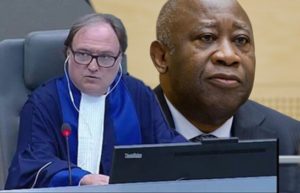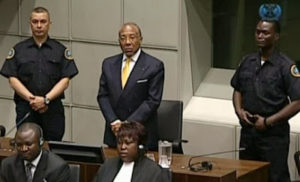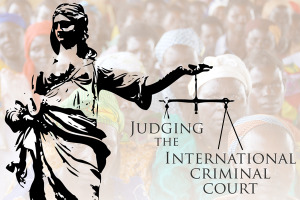I have been railing for years against the unfairness and incompetence of the International Criminal Court (ICC).
I can cite such commentaries as “Alas, the ICC Charging Bashir of Sudan with Genocide Means Nothing!” July 15, 2008, “ICC Double Standards…,” June 29, 2011, “No Equitable Justice in ICC Prosecuting Kenya’s Kenyatta,” March 25, 2013, and “International Criminal Court Lost All Credibility,” June 5, 2013. But most notable is “ICC Decides Not to Prosecute Kenya’s Kenyatta. Duh,” December 8, 2014. It includes this instructive, precedent-setting observation:
____________________
 Last week the International Criminal Court in The Hague decided not to prosecute the president of Kenya for inciting ethnic violence that killed 1200 men, women, and children, and displaced 600,000. …
Last week the International Criminal Court in The Hague decided not to prosecute the president of Kenya for inciting ethnic violence that killed 1200 men, women, and children, and displaced 600,000. …
As my headline indicates, I was not surprised by the ICC’s decision. I have written a series of commentaries foreshadowing it and delineating why the ICC is such a hopelessly discredited institution.
In fact, this case was as much about the ICC’s credibility as it was about Kenyatta’s guilt. [My commentaries] explain not only why this case failed, but also why the ICC should be abolished.
____________________
 Given that, this comes as no surprise:
Given that, this comes as no surprise:
Former Ivory Coast President Laurent Gbagbo — who was charged with crimes against humanity in connection with violence that left 3000 dead — has been acquitted. … The violence in 2010 in Ivory Coast came after Gbagbo refused to accept that he had lost a disputed election to his rival, Alassane Ouattara.
(The Daily Beast, January 15, 2019)
Mind you, I was convinced that, like Kenyatta, Gbagbo was guilty as charged. I indicted him accordingly in “Noose Tightens on Gbagbo in Ivory Coast,” April 11, 2011. Any leader who incites people to protest the outcome of a democratic election should be held responsible for the mayhem and death that ensue.
It’s just that the ICC is guilty of such selective prosecution, it operates as little more than a paternal tool of neo-colonialism. What’s particularly damning is that it has yet to prosecute a non-black strongman like Erdogan of Turkey, Sisi of Egypt, Salman of Saudi Arabia, or Putin of Russia. After all, Kenyatta and Gbagbo incited family squabbles compared to the massacres those men incited.
13 years, 1 billion dollars, 2 convictions: Is the International Criminal Court worth it? …
23 cases in 9 situations have been brought before the ICC thus far – all from Africa. … ‘Where is a white man convicted by the ICC?’ John Mahama, President of Ghana, acknowledged that while the ICC has relevance in his view, Africa ‘feels targeted’ by it.
(Deutsche Welle, January 27, 2016)
Meanwhile, the ICC’s failed attempts to convict so many high-profile defendants – who had blood still dripping from their hands – does not inspire confidence.
For an institution dreamt up to hold the world’s most powerful to account, the former Ivorian president’s extradition to The Hague was a signal the ICC was up to the challenge.
Great expectations make the failure even more bitter for a prosecution still reeling from the dramatic collapse of the case of Jean-Pierre Bemba, the former DR Congo vice-president whose conviction for war crimes and crimes against humanity was overturned.
(BBC, January 15, 2019)
 If they felt they needed judicial overlords, Kenya and Ivory Coast would have been far better served by a “shoestring special court” under the auspices of the United Nations.
If they felt they needed judicial overlords, Kenya and Ivory Coast would have been far better served by a “shoestring special court” under the auspices of the United Nations.
Other countries have used such courts to prosecute local leaders for similar crimes. Most notable were International Criminal Tribunals for the former Yugoslavia (ICTY), Rwanda (ICTR) and Sierra Leone (SCSL), which resulted in the notorious conviction of no less a person than Charles Taylor, the former president of Liberia.
More to the point, though, I hope this acquittal finally forces African countries to do what I’ve been urging Caribbean countries to in commentaries like “For Independence Sake, Caribbean, Abolish the Privy Council!” February 1, 2016, and “No More Privy Council; Take Care of Your Own Judicial Mess,” October 8, 2009. The latter includes the following:
____________________
In an interview published in the September 20, 2009, edition of The Financial Times, Lord Phillips complained that the five British judges who sit on the Privy Council spend 40 percent of their time adjudicating cases from the former colonies. He indicated – with forlorn hope – that he wished these now-independent countries
would stop using the Privy Council and set up their own final courts of appeal instead.
You’d think Lord Phillips’s admonition would chasten any self-respecting Caribbean leader. And, that this in turn would compel that leader to relieve Britain of this ‘white man’s burden,’ which is plainly anachronistic, untenable, and unfair. Not to mention that Lord Phillips is only admonishing Caribbean leaders to do what they have known for nearly 40 years they should, indeed must, do.
Yet I fear it will take far more than paternal rebukes to get our leaders to do the right thing.
____________________
Nearly 70 years after decolonialization, I hope African countries will finally help Caribbean countries see the categorical imperative of handling their own judicial affairs.
 As it happens, Ivory Coast ended up prosecuting Gbagbo in absentia. This alone threw into stark relief the self-abnegating folly of relying on the ICC to prosecute crooked or genocidal local leaders:
As it happens, Ivory Coast ended up prosecuting Gbagbo in absentia. This alone threw into stark relief the self-abnegating folly of relying on the ICC to prosecute crooked or genocidal local leaders:
Gbagbo still faces a 20-year jail term for ‘economic crimes’ imposed by a local court last year.
(France24, January 17, 2019)
What’s more, this poses the ironic and seemingly unfair prospect of subjecting him to double jeopardy. That is, assuming ICC prosecutor Fatou Bensouda fails in her face-saving bid to keep Gbagbo in The Hague for life by appealing his acquittal.
What a farce!
Related commentaries:
ICC decides not to prosecute…
noose tightens on Gbagbo…
For independence sake…
